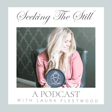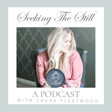
8: My Husband’s Perspective
When your spouse deals with the physical and emotional effects of anxiety, what is the best way to support them? What helps? What makes things worse?
In this episode, Laura interviews her husband, Justin Fleetwood about what it was like for him during her season of intense anxiety and depression. Justin opens up about his frustrations and what he learned about being the primary support person during this time.
If you are the loved one of someone with anxiety, this is a must-listen episode!
To learn more about the products Laura mentions in this episode, visit podcast sponsor, Cindy Jenks, an ambassador with QSciences at myqwellness.com or email her questions at cindy@myqwellness.com.
Seeking The Still Website: Seekingthestill.com
Seeking The Still Instagram: Instagram.com/seekingthestill
Seeking The Still Facebook: Facebook.com/seekthestill

